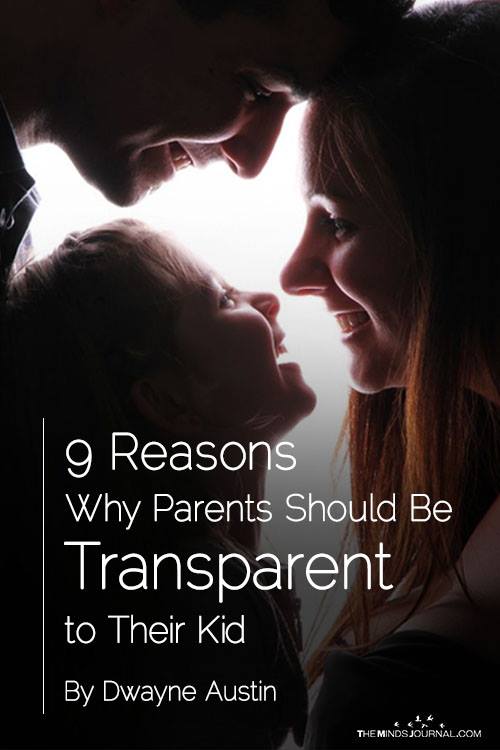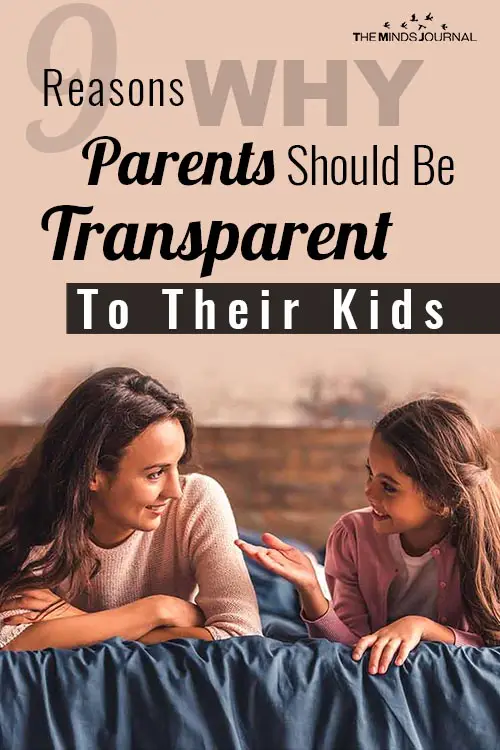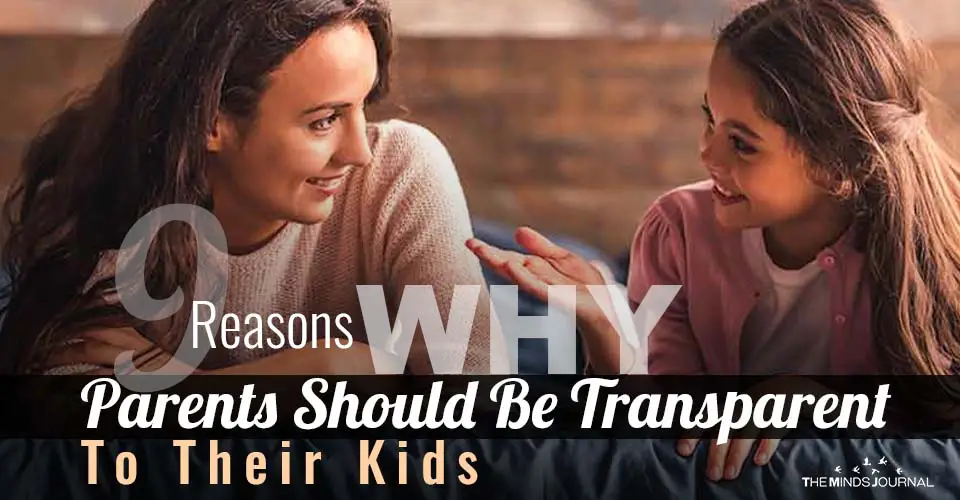Being honest can be quite difficult for some people, especially when you’re confronted with your child that asks questions about everything. How to be transparent to kids?
Here’re 9 Reasons Why Parents Should Be Transparent to Their Kids
1. They Will Be Able To Make A Choice
Giving my child the ability to make their own choices because they come to me with questions and look for understanding, it’s very reassuring for their future.
By being transparent to your kids, you’re allowing them to retain the necessary information they need to have to be able to make the right choice. They will be able to decide more and more for themselves which shows strong character and confidence. Plus this will form a strong base for positive mental health[1] as well.
Related: If Happiness Is A Choice Why Are So Many People Miserable?
2. Building The Trust
Regardless of what parents tend to think, just because I’m a parent doesn’t mean that I automatically deserve trust. Trust should be earned between both parent and child. Of course an aspect of respect should be present at all times.
But a parent should show that they can be trusted and create a special bond with their child. I know from experience that this can create a friendship that is everlasting between my child and myself.
Related: 11 Reasons Why Trust In A Relationship Is More Important Than Love
3. Ethics
One of the most important aspects a child needs to have a firm grasp on throughout their lives should be their own moral code, their ethics. By being honest with your child, not only are you providing a sense of moral clarity, you’ll also be encouraging truthfulness and doing the right thing.
4. Sexual Education
Have you ever wished that your parents were more honest and open with you when it came to discussing the birds and the bees [2]? When your child becomes a teenager, you must talk to him about topics like sexually transmitted diseases and how some viruses may be the cause of serious diseases like testicular cancer.
I made sure to not overstep and keep answers informative while not going into other related explanations that they didn’t ask for. Also this education is very important as it helps him self diagnose some of the sexual conditions like premature ejaculation.
If you as the parent shove out a ton of information, it’s more likely that the conversation will feel like they are being scolded or lectured, or even just overloaded with information all at once.
5. Showing A Good Example
I remember as a child, growing up and seeing when my mom or dad would do something right, they would tell the truth, for example, if a cashier gave my mother too much change, my mother would return it. That inspired me as a child to be transparent and truthful, naturally.
That’s the key to being as truthful and transparent as you can when you’re a parent, it sets a naturally good example that your child will follow without even fully being able to explain why. Of course morality comes into play as they get older and they understand right and wrong, but at an early age this kind of example is needed.
Related: Top 10 Worst Parenting Words You Should Never Use For Your Child
6. Embracing Mistakes is Okay
I made sure to never scold my child as a punishment. But instead, sit down with them and have a conversation, or even just sitting there to soak in the conversation, but I purposefully work with them, not to give them a shoulder to lean on, but to show them that they will never be abandoned.
This shows a child that mistakes are okay [3]. Being there to support them and being transparent to kids about the issue at hand so they actually understand why something is happening and why something they did or said isn’t right, will stay with them but in a healthy way.
7. Your Kids Will Share With You
As a parent, since I’ve been transparent to my kids, they will actually come to me out of trust and knowing that we have mutual respect. Of course I keep my eye on them and what they’re doing, but it’s much less likely I will find something they hid from me throughout their childhood.
Every parent is different of course, every family is different. Overall, I’ve found that it’s very refreshing to be able to have that bond and to have my child come to me when they have a problem. Instead of assuming the outcome beforehand.
Related: 10 Reasons Why Your Grown Kids Don’t Like You
8. Teaching Your Child Self-Love
When you teach your child about trust and openness, you’ll also be teaching them about self-love at the same time. This is extremely important and will stay with them throughout their life. Self-love will encourage them to understand that no one is perfect and that’s completely okay.
Related: 12 Tips To Self-Love And Compassion
9. They Won’t Hide Their Feelings
All too often a children will feel like they can’t come to their parents because their parents will be too mad or disappointed [4]. While this is sometimes the case, it shouldn’t be. In my experience this pushes the bond between child and parent so far apart it can actually hurt the relationship as the child becomes older as well.
This will also encourage a more selfless attitude as well. You want to provide a safe and trusted place for your child to vent about their problems and the positives in their life.
Conclusion
Overall, my child is smart, your child is smart [5], they aren’t naive, they pick up on social cues and they can tell when someone is just making up a story. In short, be honest, transparent, and most of all be there for your child.
Have you learned a different perspective when it comes to parenting?
References
1. https://www.nimh.nih.gov/health/topics/child-and-adolescent-mental-health/index.shtml
2. https://www.romper.com/p/11-reasons-why-you-should-be-completely-honest-with-your-kid-about-your-past-5382
3. https://www.babycenter.com/0_the-honest-child-how-to-teach-honesty-ages-6-to-8_67924.bc
4.http://www.aboutkidshealth.ca/En/HealthAZ/FamilyandPeerRelations/sexuality/Pages/sex-Education-for-Children-8-Tips-for-Parents.aspx










Leave a Reply
You must be logged in to post a comment.